- Republican Donald Trump and Democrat Bernie Sanders won the New Hampshire primaries and Ohio Gov. John Kasich grabbed the 2nd place GOP finish
- Hillary Clinton conceded to Sanders but her team argues the race is just beginning.
- Full results from the 2016 New Hampshire primary.
- Share via
Stay informed throughout election season
Like Trail Guide and the work from our team? Sign up below to receive our Essential Politics newsletter, free in your inbox every weekday.
- Share via
Chants propping him up, Trump basks in his big win
Donald Trump basked in his first election victory Tuesday night in the New Hampshire primary, striding onstage to the Beatles’ rock anthem “Revolution” and exclaiming to cheering supporters: “Oh, wow! Wow. Wow. Wow. So beautiful. So beautiful.”
“I am going to be the greatest jobs president that God ever created,” the New York billionaire told a banquet hall crammed with hundreds of supporters. “Remember that.”
“USA! USA! USA!” his supporters chanted over and over, along with “Trump! Trump! Trump!”
He thanked his opponents in the race for the Republican presidential nomination, saying a number of them had called after it was clear he’d won New Hampshire.
“I wanted to congratulate the other candidates, OK?” Trump said.
“Now that I got that over with,” the insult-prone candidate said to laughter. “You know, it’s always tough, and then tomorrow – boom, boom.”
In a 15-minute speech, Trump, surrounded by his wife, adult children and others, touched on his campaign’s main themes, including his pledge to crack down on illegal immigration and build a wall on the U.S.-Mexico border.
“Build that wall!” the audience yelled. “Build that wall! Build that wall!”
Trump also mentioned his vow to build up the U.S. military. “We’re going to knock the hell out of ISIS,” he said.
Once he is president, Trump said, the United States will beat Mexico, China and Japan in trade.
“The world is going to respect us again, believe me,” he said.
In thanking his family, Trump struck an uncharacteristically personal note as he paid tribute to his late brother, Fred Trump Jr., whose alcoholism he has discussed on occasion during the campaign.
“What a fantastic guy,” Trump said. “I learned so much from Fred.”
At the end of his speech, Trump returned to his campaign slogan.
“You are going to be so happy,” he said. “We are going to make America so great again – maybe greater than ever before.”
Looking ahead to the next big primary, Trump shouted to the cheering crowd: “We are going now to South Carolina! We’re going to win in South Carolina! I love you all. Thank you very much.”
The driving electric guitar of “Revolution” then began playing once again as Trump walked off stage.
- Share via
Jim Gilmore wins 118 votes but is not dropping out of the race just yet
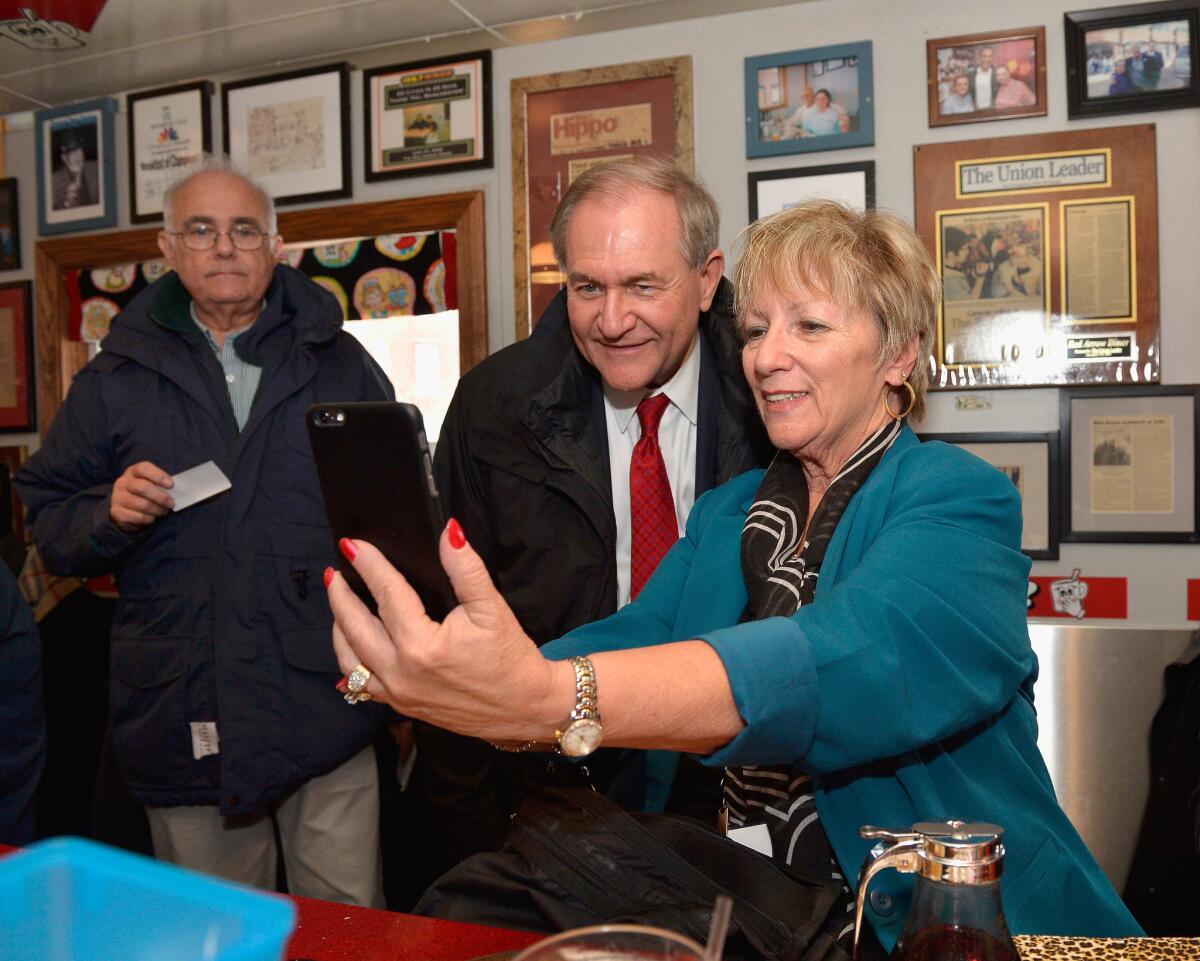
Former Virginia Gov. Jim Gilmore is still kicking. The last-place candidate received 118 votes in the Granite State —roughly the same number as former Pennsylvania Sen. Rick Santorum, who dropped out of the race last week — with 81% of precincts reporting.
Will he drop out?
“That is a decision that we will assess, not tonight,” Gilmore said in an interview with The Times on Tuesday three hours after polls closed. “We obviously did run as hard as we could in the state of New Hampshire. At the end of the day the exclusion from the debates was critical.”
Gilmore never had a high enough standing in the polls to appear on a prime-time debate stage.
He visited voters at four polling places in Manchester, Londonderry and Bedford before attending his watch party, he said. USA Today reported that about 10 people showed up to his campaign headquarters to watch returns.
Never mind the number of people in the room, Gilmore said it was important for him to express his appreciation and warmth to staff and supporters.
Gilmore has had a tough go of it this campaign. He got the vote of just 12 caucusgoers in Iowa last week.
His home state of Virginia holds its primary on March 1.
- Share via
Map: Sanders defeated Clinton by winning areas she carried in 2008
- Share via
Bellwether New Hampshire towns get it right again (so far)
This morning we gave you a list of the 13 New Hampshire towns that have correctly picked either the Republican or Democratic primary results in every election since 1952.
So far they’ve got it right again, based on unofficial returns reported by the Associated Press.
On the Democratic side there was little doubt. Hillary Clinton won only two towns with sizable populations - Bedford and Windham.
On the Republican side, the five towns out of seven that have reported results so far not only had Donald Trump as the winner but John Kasich in second place. Here’s the breakdown:
- East Kingston: Trump 34%, Kasich 13.9%
- Lancaster: Trump 29.5%, Kasich 18.3%
- Newmarket: Trump 29.2%, Kasich 20.2%
- Sanbornton: Trump 36.6%, Kasich 15.3%
- Washington: Trump 47.1%, Kasich and Cruz 17.5%
Rochester and Pembroke are still outstanding as of midnight Eastern time.
- Share via
Watch: Spurs Coach Gregg Popovich wasn’t pleased with New Hampshire results
San Antonio Spurs Coach Gregg Popovich was not happy to hear the winners of the New Hampshire primary.
The five-time world champion coach is known to be a little grumpy during in-game interviews, but he perked up a little when reporter David Aldridge asked Tuesday night if he wanted to know the winners.
“Who is it, what is it?” asked an excited Popovich.
“Sanders and, uh, Trump,” Aldridge said.
Popovich’s face froze before he walked away, shaking his lowered head.
Hard to know which result upset him, but Popovich donated $5,000 to President Obama in 2012.
- Share via
Chris Christie in or out? Taking a pause
In his speech tonight as returns showed him in sixth place with 7.7% in New Hampshire, Gov. Chris Christie signaled the end of his campaign might be near.
The New Jersey governor said he and his wife, MaryPat, would go home to New Jersey for the first time in two weeks. They plan to “take a deep breath [and] see what the final results are tonight, because that matters.”
“We want to see exactly what happens,” Christie said, as Twitter went nuts with posts saying he was “out” of the race.
But not so fast, the governor said: Waiting until all the votes are counted will “allow us to make a decision about how we move from here in this race.”
He said there was no reason to “sit in a hotel room in South Carolina” to see the results. From New Jersey, the couple will “make a decision on our next step forward,” he said.
- Share via
Cruz touts ‘the result all of us were told was impossible’
Texas Sen. Ted Cruz noted that he’s currently in third place in New Hampshire’s primary, while speaking to supporters at a campaign rally in Hollis, N.H.
“That was the result all of us were told was impossible,” he said. “Together we have done what the pundits and the media said could not be done, and what the Washington establishment desperately hoped would not be done.”
Cruz reminded his supporters that the same naysayers also wrongly predicted he’d lose Iowa.
“I had opposed the ethanol mandate, taking on Washington and corporate welfare,” he said. “My opponents attacked me, promising even more cronyism, and lobbyists spent millions of dollars in attack ads against our campaign. Yet the people of Iowa put their country first.”
He said his performance in New Hampshire has again discounted the media and “Washington insiders”
“This week history repeated itself,” he said. “Once again, the talking heads and the Washington insiders were confident that our wave of support would break against the rock of the Granite State; that a conservative, we were told, could not do well in the state of New Hampshire.”
- Share via
Kasich says his second-place finish means ‘turning a page on a dark part of American politics’
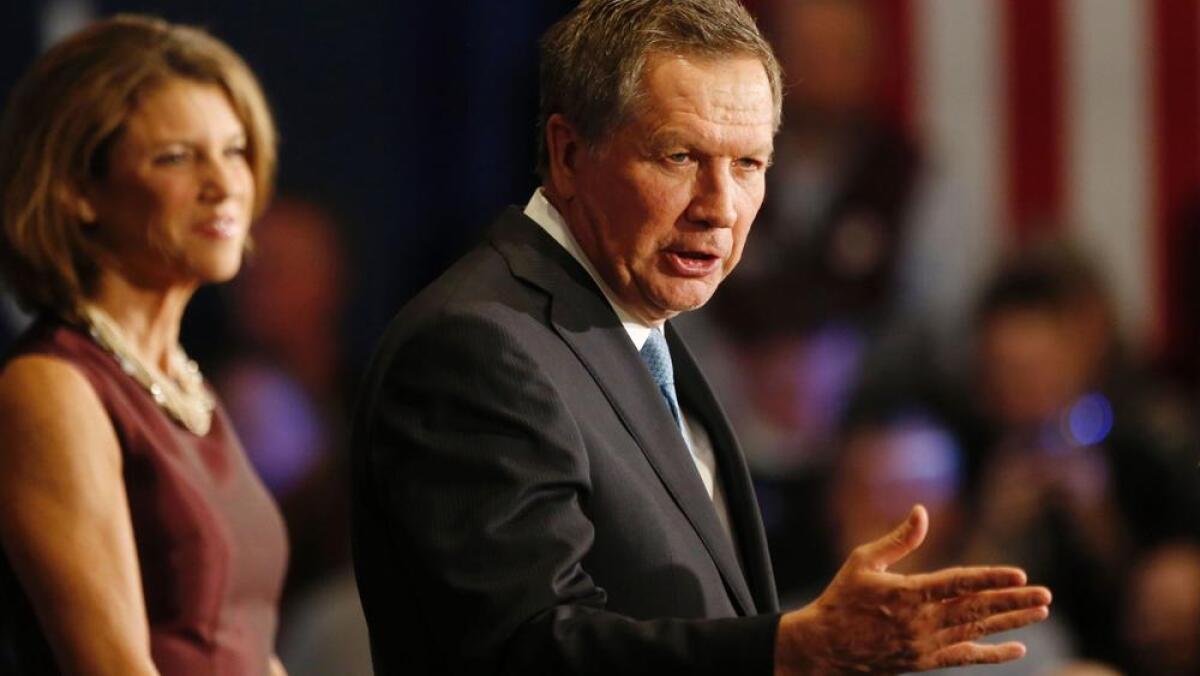
John Kasich, who ran a largely upbeat campaign to a second-place finish in New Hampshire, used his victory speech Tuesday to prove his approach was the right one.
“Something big happened tonight,” said the Ohio governor, criticizing the onslaught of negative ads against him. He finished second to Donald Trump.
“Maybe, just maybe, we are turning a page on a dark part of American politics, because tonight the light overcame the darkness of negative campaigning.”
Kasich has been an underdog throughout the early nominating season and needed a substantial finish Tuesday to propel his campaign to the next contests.
Tuesday, he said, was just the beginning.
“You just wait,” he told supporters. “There’s so much going to happen. If you don’t have a seat belt, go get one.”
- Share via
Yes, the debate hurt, Rubio tells supporters
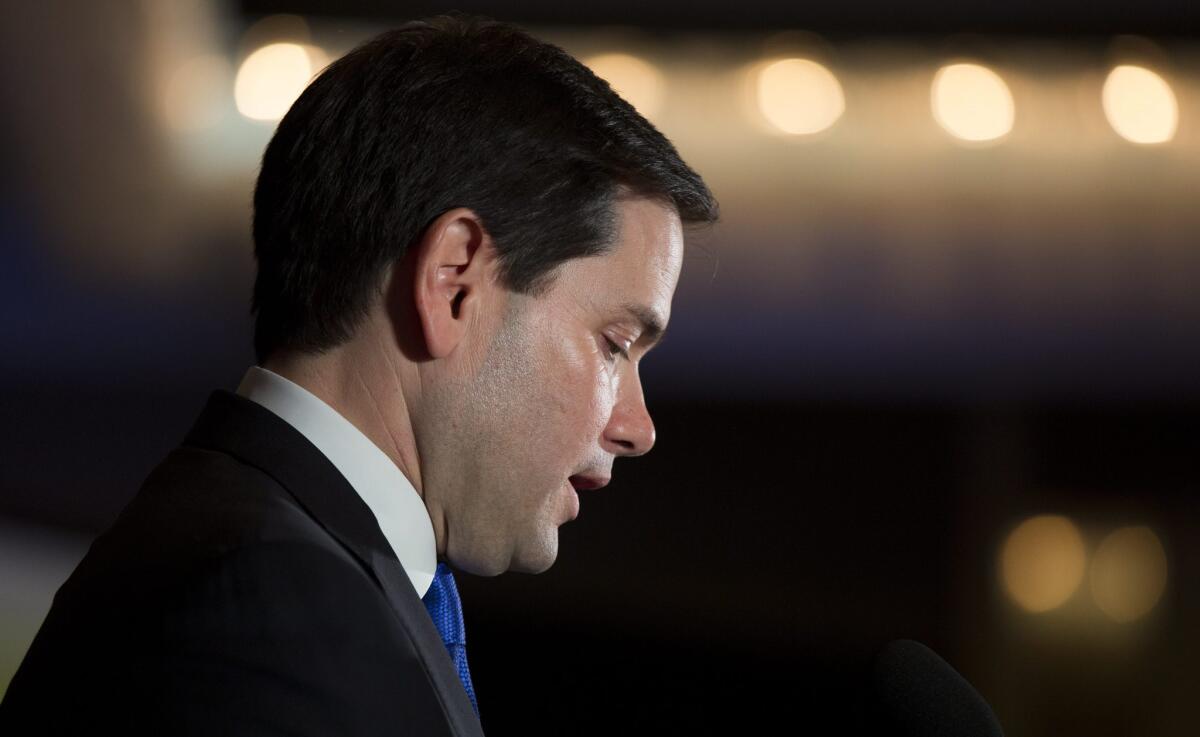
Marco Rubio took full responsibility for his disappointing fifth-place finish in the New Hampshire primary on Tuesday night and apologized for an uneven debate performance that provided fodder to his Republican rivals.
“Our disappointment tonight is not on you. It’s on me,” the Florida senator told the crowd at a downtown Manchester hotel. “I did not do well on Saturday night. That will never happen again.”
His supporters have been downcast for much of the night, but they cheered loudly for their candidate and chanted his name.
Rubio’s speech left no doubt that he agreed with political commentators who said Saturday’s debate harmed his candidacy.
“We did not wind up where we wanted to be,” he said. “But that does not change where we will wind up at the end of the election.”
Rubio said he would press on to South Carolina, which holds the next Republican primary on Feb. 20.
- Share via
Trump: ‘Do we love the people of New Hampshire?’
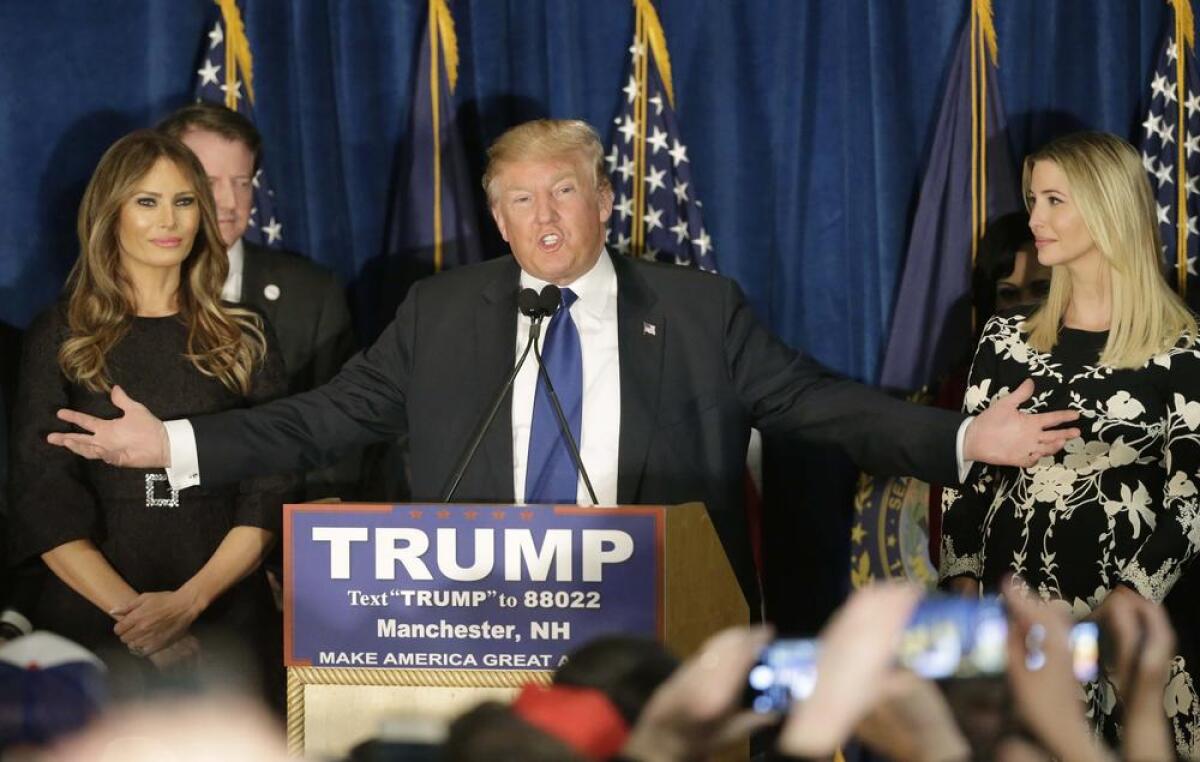
Donald Trump, confident and reflective as ever following his victory in New Hampshire’s Republican primary on Tuesday, extolled praise upon voters in the state.
“Do we love the people of New Hampshire?” said Trump at a campaign rally in Manchester on Tuesday night. “I said it and I said it a year ago – ‘I think I’m going to do well there, because I’m here a lot and it’s so beautiful.’”
“I have so many friends up here,” he said of his Granite State supporters. “New Hampshire, I want to thank you. We love you and we’re going to be back a lot.”
Trump also congratulated other candidates in the crowded GOP race, saying there’s some “real talent” among those in the field.
Some of Trump’s proposals seem to have resonated with New Hampshire Republicans.
Based on exit polls released Tuesday, two-thirds of Granite State GOP voters favor temporarily banning Muslims who are not U.S. citizens from entering the country.
In December, Trump announced a plan to ban foreign Muslims from entering the country.
The plan -- which was castigated by Democrats and Republicans alike -- came on the heels of terrorist attacks in San Bernardino and Paris by people who had pledged an allegiance to Islamic State terrorists.
On stage Tuesday, flanked by his wife, Melania, and children, Trump also thanked his family.
“This is something very special,” he said grinning.
- Share via
Bush: ‘This campaign is not dead’
Jeb Bush celebrated what appeared to be a midfield finish in New Hampshire, declaring that his bid for the White House would continue.
“This campaign is not dead. We’re going on to South Carolina,” he told cheering supporters gathered at a community college in Manchester. They chanted “Jeb! Jeb! Jeb!” and waved American flags. “I know how to do this because I was a conservative reform governor in the state of Florida.”
In early returns, Bush appeared to be one of three candidates locked in a tight battle for third place in the New Hampshire primary.
He reiterated the fundamental argument of the campaign, which has fallen flat with a large bloc of restive GOP voters this year: that he has the experience to be an effective leader in Washington, and that he would be the most competitive against the Democratic nominee.
“We need someone who’s been tested and I’m that guy,” Bush said.
- Share via
Clinton supporters say they expected her loss
For former Rep. Carol Shea Porter, who endorsed Barack Obama in 2008, there was some unhappy deja vu Tuesday.
“It’s always more fun to win, isn’t it?” Shea Porter said. But she said Clinton’s supporters in New Hampshire always knew it would be a tough fight.
“This is one state out of a lot of states,” said Shea Porter, who is running to reclaim the seat she lost in 2014. “Everybody worked very hard on the Bernie side and on the Hillary side, and we’ll see what happens in the next state. But it is the beginning. What I’m still proud of is we have two strong progressive candidates.”
Privately some Clinton supporters said there was never any doubt, even as the former secretary of State campaigned aggressively across New Hampshire, that the deficit was too steep to overcome. Shea Porter said the time spent here was not wasted even as other contests loom. “She was connecting with people and had an opportunity to talk more about who she is and what her vision is,” she said. “People know her better.”
Rep. Jim Himes of Connecticut, a more centrist Democrat who was one of several out-of-state lawmakers on hand, discounted the outcome as a “protest vote.”
“I think this is less about Hillary than it is about residual anger with what happened in 2008,” he said. “And I think we all are aware that this race really opens up once we get south of here into South Carolina and Nevada.”
Elizabeth Lorris Ritter was one of many out-of-state supporters attending Clinton’s event. She was bused up by the Human Rights Campaign to canvass over the weekend, and decided to stay through election day.
She said she thought Clinton’s support for stricter gun measures hurt her in what she argued was a “solidly pro-gun state.”
“I’m feeling pretty good about South Carolina, where the Clintons are beloved and Bernie is unheard of,” she said.
Lorris Ritter rejected criticism of Clinton as insufficiently progressive. “Bernie’s got vision, and that’s great. I support Bernie’s vision,” she said. “I want a president who’s got vision. But I also want a president who’s got a plan. And unlike Bernie, Hillary’s got both.”
- Share via
Just how long did Bernie Sanders speak?
As far as victory speeches go, Bernie Sanders did not cut corners.
Clocking in at 26 minutes, 13 seconds, on C-Span, which can be seen here.
Even Ohio Gov. John Kasich recognized it went on for a while, saying in his second-place victory speech, “Bernie talked so long I thought he was going to hit his 77th birthday before he got off stage.”
- Share via
No love lost for Christie
- Share via
From sea to shining sea?
- Share via
Kasich takes second place, AP reports
- Share via
Booing Clinton, and other scenes from Trump HQ
Bursts of cheers erupted at Donald Trump’s election night party as television anchors started announcing early returns.
“We hope he wins tonight, but New Hampshire’s kind of a fickle place,” said Robert Mannino Jr. of South Hampton, as he and his wife, Christine Paul, awaited definitive results and before Trump was declared the winner. “Polls said he would win Iowa, and he didn’t.”
Hundreds of Trump supporters gathered at a banquet hall near the Manchester airport, many of them sipping beer or wine in plastic cups while watching CNN’s election coverage on monitors mounted around the room.
Mannino, 64, and Paul, 67, who run a healthcare public relations firm, have seen Trump speak five times in New Hampshire and Massachusetts. They were hoping Trump’s remarks on stage in the banquet hall Tuesday would be the first victory speech in his campaign for the Republican presidential nomination.
“We think he’s the only one that’s really qualified,” Mannino said.
“A turnaround guy who comes in and makes things happen,” Paul added.
Later in the night, the crowd waited through speeches from both Hillary Clinton and Bernie Sanders, who won the Democratic fight.
People in the room said they were proud to stand with Trump.
Kyle Barnsley of Bedford described the real estate mogul as a man unafraid “to say what’s right.”
“I feel like all these other candidates are puppets,” said Barnsley, 19, a pharmaceutical technician.
“The silent majority is very angry,” said Donna Horvit, 58, a retired food business owner who lives in Londonderry. “They’re very tired of the status quo, and they’re looking for a refreshing non-politician politician, if you know what I mean.”
Looking ahead to the next primary, she pumped a fist into the air and said, “On to South Carolina.”
- Share via
Still going: Ben Carson pushes on to South Carolina and Nevada
Ben Carson, who trailed all other major GOP candidates in Tuesday’s New Hampshire primary, vowed to push on to the next state contests.
“One of the most enjoyable aspects of the election process is getting to meet so many great people across the country, and New Hampshire has been no exception,” Carson, the neurosurgeon, said in a statement.
“Voters around the country are looking for new leadership in Washington, which is why I’m working so hard to return ‘We the People’ to the White House,” he said. “I will carry on this fight for as long as the people stand with me. As we now move on to South Carolina, Nevada and the Super Tuesday states, I will continue to stand for integrity, accountability and honest leadership.”
- Share via
Marco Rubio supporters deflated, hoped for a stronger finish
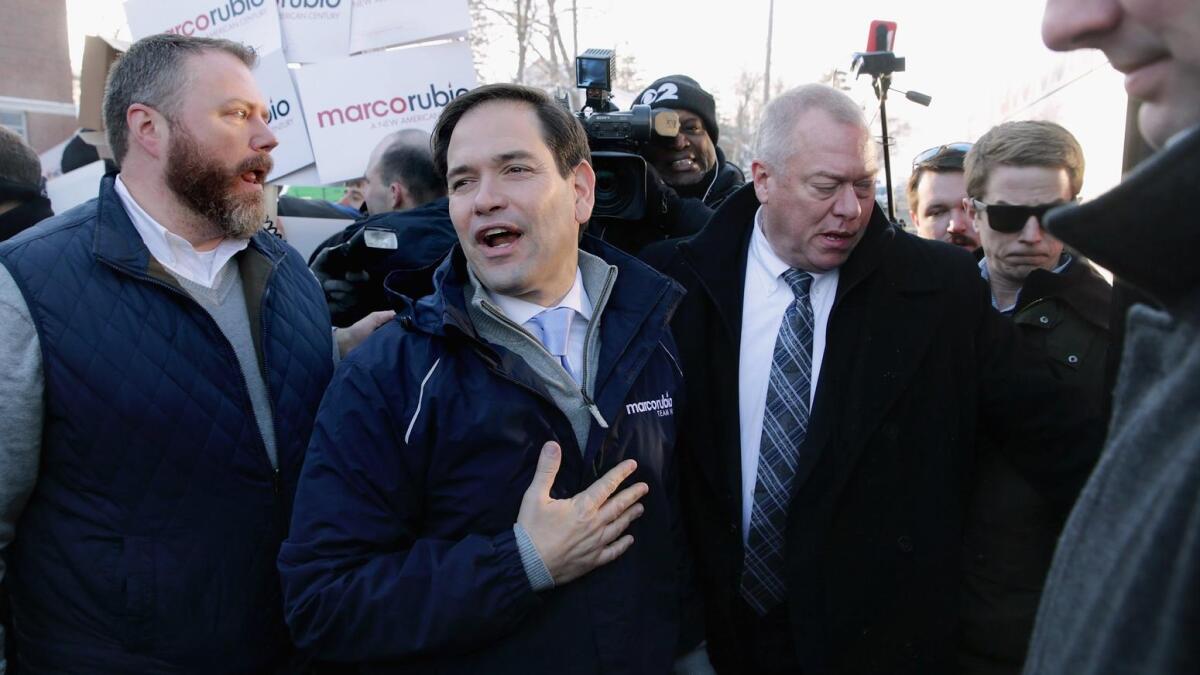
For Marco Rubio supporters, the victory night party turned into a sobering assessment of the long road ahead.
“We were hoping for a strong second,” said Peter Heed, 65, a lawyer and former district attorney from Keene, who “thought Rubio would resonate a little more.”
“It’s going to be tough now,” he said.
A number of backers in the ballroom at the Radisson, which has served as the epicenter of the political and media ecosystems in Manchester, seemed disappointed with how things have turned out for their candidate.
Dan Schiappa, 47, of Bedford said he hoped Rubio would finish third.
The cybersecurity executive said he was so frustrated by Rubio’s stammering in the debate, “I wrote down what I would have said if I was him.”
However, he said, “if you erase that part of the debate, he did great.”
Heed said he had been to a number of Rubio events and had always been impressed, but was disappointed by the senator’s debate performance.
“I’ve never seen him stumble like that. I think that hurt. Talking to a few people I know, they just said, ‘What happened? What happened?’”
He and his wife, Tricia Heed, a 64-year-old teacher, remain Rubio supporters and see him as a strong candidate in the general election.
She gestured around the crowd and said, “It’s not a room of gray-haired Republicans.”
- Share via
Noted
- Share via
How John Kasich put himself in position to emerge in New Hampshire
Ohio Gov. John Kasich is on pace to claim the crucial second-place spot in New Hampshire, making the case that he’s the establishment’s best hope of defeating Donald Trump.
Curious who he is and how he did it? Here’s an early look at his strategy for winning the state.
- Share via
Clinton’s concession speech mirrors Facebook’s data
Ahead of the New Hampshire primary, campaign finance was the most talked about topic in New Hampshire on Facebook.
Hillary Clinton kicked off her post-primary speech by addressing that very issue.
She also referred to taxes and the economy — the No. 2 and No. 3 spots on Facebook’s tabulation of the volume of political conversation.
Facebook’s data cover from Feb. 1 through Sunday.
- Share via
Fiorina says she leaves N.H. with ‘wind at our backs’
Carly Fiorina, who was in the bottom tier of candidates in the early returns from New Hampshire on Tuesday, pledged to continue her presidential bid.
“I am convinced this is my highest calling as a leader,” she said, speaking at her primary night party at a Manchester country club alongside her husband, Frank. “You have given me the energy and the determination and the wind at our backs as we continue this fight.”
Fiorina spent a considerable amount of time in New Hampshire, holding the rallies, house parties and town halls that are a key part of the state’s retail campaigning. In the early returns, she appears to have done better here than she did in last week’s Iowa caucuses, where she received 1.9% of the vote.
The former Hewlett-Packard chief and failed 2010 U.S. Senate candidate from California had a promising moment in the fall, when strong debate performances gave her some momentum in the polls. But she has since faded, and did not appear on the prime-time debate stage during the most recent GOP debate on Saturday.
- Share via
Flashback to 2008, and a campaign disappointed
Some perspective from the former Obama speechwriter credited with the “Yes we can” speech.
Eight years ago, then-Sen. Barack Obama led Hillary Clinton in seven polls leading up to the actual vote, by an average of 8.3 percentage points, so his team was feeling pretty confident.
But Clinton prevailed by 2.6 percentage points on election day. I was at Obama headquarters that night, and shot this video of an anxious crowd before it had heard the glum news.
Favreau explains what happened next.
- Share via
Hillary Clinton calls to congratulate Bernie Sanders
- Share via
Sanders wins New Hampshire primary, plays basketball
Bernie Sanders’ campaign Snapchatted this image of the presidential candidate shortly after he won the New Hampshire primary.
It’s unknown whether he made the shot.
- Share via
Kasich leads in race for coveted second place in New Hampshire
Ohio Gov. John Kasich is making a case that he is the best alternative to Donald Trump, taking 15% of the vote with 27% of precincts reporting in the New Hampshire primary, with his message that the party must show a more compassionate and compromising side.
“Gov. Kasich is now the leading governor in the race and the only one with a realistic chance at the nomination,” said John Weaver, a senior strategist for the campaign. “He showed that a conservative with a positive message will succeed and, in fact, that’s the only way for Republicans to win the White House.”
But the thick cluster of rival candidates trailing behind him in the double digits -- including Sen. Ted Cruz of Texas, who won the Iowa caucuses -- will make it harder to coalesce anti-Trump supporters behind a single candidate.
Trump made political history, winning first place with an unconventional brew of celebrity, bluster and disdain for the traditional rules of politics.
- Share via
My how times change
- Share via
Sanders is first Jewish candidate to win presidential primary
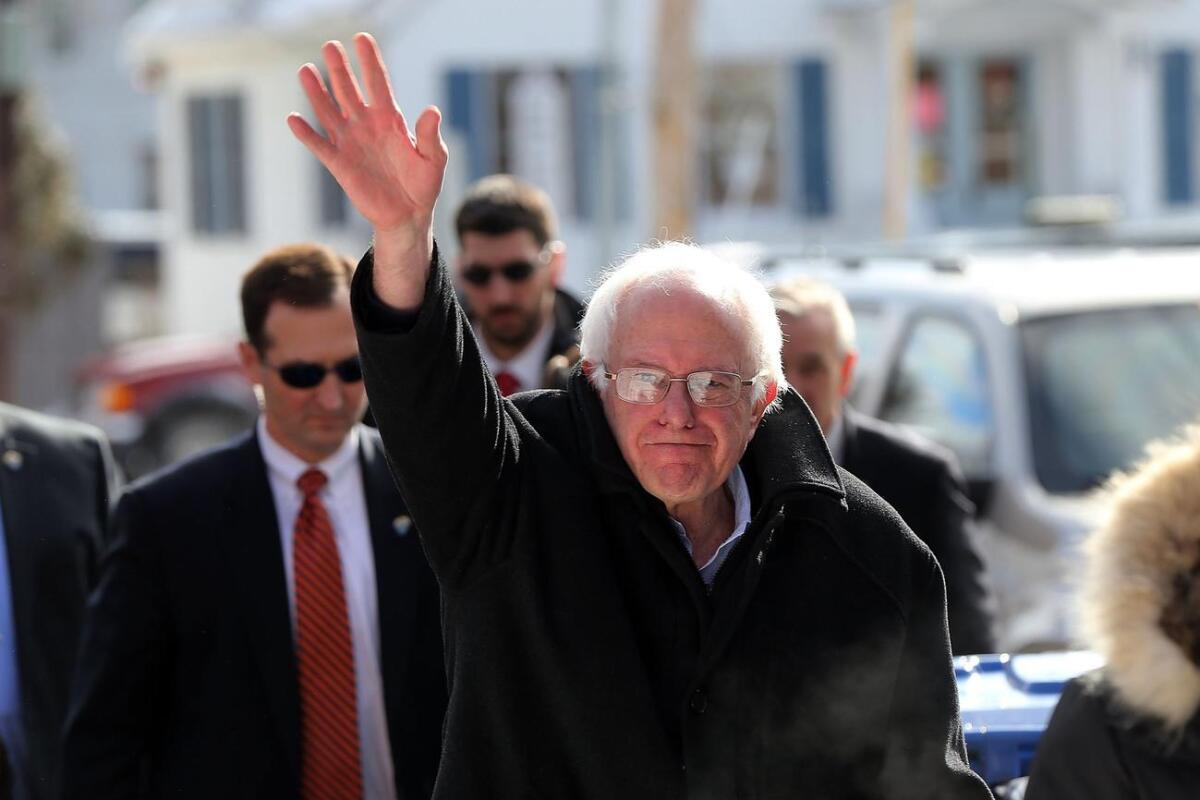
Sen. Bernie Sanders of Vermont made history Tuesday, becoming the first person of Jewish faith to win a presidential nominating contest.
He defeated Hillary Clinton, who won the state’s Democratic primary in 2008.
The Jewish Chronicle took note that Sanders came close to being the first non-Christian to win a contest, but fell short last week during the Iowa caucuses.
Pew Research Center tallies how a majority of U.S. presidents have been Episcopalian or Protestant.
“It’s a guiding principle in my life, absolutely, it is,” Sanders said of his faith at a recent CNN town hall. “I would not be running for president of the United States if I did not have very strong religious and spiritual feelings.”
- Share via
In good spirits at Trump HQ
A roar of cheers erupted at Donald Trump’s election-night party when CNN declared him the winner of the New Hampshire primary.
The announcement on television monitors placed around the banquet hall came immediately after polls closed at 8 p.m.
Over and over, the crowd of hundreds chanted, “Trump, Trump, Trump, Trump!”
The Republican presidential hopeful was expected to address the crowd later in the evening from a stage with a blue-curtain backdrop.
- Share via
Cheery songs despite gloomy outcome at Clinton camp
The Clinton campaign chose Southern New Hampshire University to host its election night viewing event, a somewhat superstitious play given it was here eight years ago that she claimed a surprise primary victory.
As 8 p.m. came and went, however, there was no sign of the reality unfolding outside the university gymnasium.
Televisions were not tuned to primary night coverage, displaying instead the Hillary “H” logo with the words: “Fighting For Us” on a blue screen.
A series of cheery songs, including Pharrell’s “Happy,” blared overhead. The room was half empty, as security lines kept many out in the cold.
- Share via
Political earthquake hits New Hampshire
- Share via
AP calls the race: Trump, Sanders win New Hampshire
- Share via
Just wait until March, Clinton campaign says
With Bernie Sanders securing a quick victory Tuesday night in New Hampshire, Hillary Clinton is digging in to battle for the Democratic presidential nomination.
Robby Mook, Clinton’s campaign manager, wrote in a memo that the team has heavily invested in states that will hold primaries and caucuses in March, when 56% of delegates will be up for grabs.
By comparison, the four early states – Iowa, New Hampshire, Nevada and South Carolina – are responsible for only 4% of delegates.
In addition, Mook said he expects Clinton to do well in more diverse areas of the country.
“The March states better reflect the true diversity of the Democratic Party and the nation – including large populations of voters who live in big cities and small towns, and voters with a much broader range of races and religions,” he wrote in his memo.
Evan Halper and Michael A. Memoli recently wrote about how Clinton was already looking past New Hampshire to other states.
- Share via
The Senate as stage: Ted Cruz returns to Washington for Wednesday’s big debate on North Korea
- Share via
People fight traffic and lines to make it to New Hampshire polls
The polls are closing, but as aerial shots and on-the-ground images show, New Hampshire residents are still trying to cast their votes.
The Merrimack High School polling location has already confirmed that it will stay open “as long as the moderator deems necessary” to accommodate the voter turnout.
- Share via
Bracing for a GOP shakeout
- Share via
Voters kept a close eye on debates, exit polls say
Could this be a bad sign for Marco Rubio?
Two-thirds of Republican voters in New Hampshire said recent debates were an important part of their decision in Tuesday’s primary, according to exit polls.
Rubio’s rivals have seized on his uneven performance in Saturday’s debate to paint him as unprepared for the White House.
The primary results here could help show if voters reached a similar conclusion.
- Share via
Clinton campaign concedes defeat to Bernie Sanders
Sen. Bernie Sanders of Vermont jumped to an early lead over Hillary Clinton in the New Hampshire primary Tuesday, energizing core liberals and younger voters with his focus on income inequality and anti-Wall Street populism.
Clinton, the former secretary of State and establishment favorite, had been anticipating a blow in New Hampshire, the first primary state, after her narrow victory in Iowa’s caucuses.
Clinton is hoping to reboot her efforts as the race moves to friendlier territory in the West and South, while Sanders hopes a strong early showing builds his case that he is a serious alternative for the party’s nomination.
- Share via
Amid big turnout, Bernie Sanders looks headed for a strong win in New Hampshire
Sen. Bernie Sanders appeared headed toward victory in New Hampshire’s primary, as polls in many parts of the state stayed open past their normal closing times to accommodate a large turnout.
The campaigns of both Sanders and Hillary Clinton were bracing for a decisive win by the Vermont senator, with exit polling data showing voters overwhelmingly sharing his views.
- Share via
Donald Trump wins in New Hampshire, AP reports
Donald Trump leapt to an early lead over the crowded field of Republicans in the New Hampshire primary Tuesday, boosting his hopes of solidifying his spot as the candidate to beat.
Second and third place are also crucial to the contest, as several candidates fight to show they are the top alternative to Trump, who leads in national GOP polls but remains unacceptable to a large portion of the Republican electorate.
- Share via
Big night ahead: A moment of quiet before Marco Rubio’s event in New Hampshire
- Share via
Keeping the polls open late
With what’s sounding like strong turnout across New Hampshire, at least one large polling location is staying open later.
Most polls close in five minutes, but because of traffic issues, officials are considering keeping Merrimack’s polling place open until 8 p.m. EST.
It is the state’s largest polling location in terms of registered voters for a single town, according to the New Hampshire secretary of state.
And here’s a look at some of the state’s old-fashioned voting traditions.
- Share via
Exit polls: Two-thirds of New Hampshire Republicans support ban on Muslims
A majority of New Hampshire Republicans support a ban on Muslims entering the country.
Based on exit polls released Tuesday, two-thirds of New Hampshire GOP voters favor temporarily banning Muslims who are not U.S. citizens from entering the country.
In December, Donald Trump, the front-runner for the GOP presidential nomination, announced a plan to ban Muslims from entering the country.
The plan -- which was castigated by Democrats and Republicans alike -- came on the heels of terrorist attacks in San Bernardino and Paris by people who had pledged an allegiance to Islamic State terrorists.
Several statewide polls in New Hampshire show Trump with a double-digit lead over his competitors.
- Share via
Exit polls: Experience, yes; electability, not so much
- Share via
Exit polls: 9 in 10 GOP voters do not like the federal government
- Share via
Stepping into the voting booth, and still undecided
It is well known that New Hampshire voters don’t take their role in electing a president lightly. Many faced with the fraught decision, in fact, were still sorting it all out right up until the moment they stepped into the voting booth Tuesday.
“I may just turn around and walk back out,” said September Hoeler, a 58-year-old Republican who was not thrilled with any of her choices. “I may not have the stomach for it.”
A few hundred feet away, Emily Doyle, 36, stood in a long line of undeclared voters waiting to register. She was still trying to decide if she would pull a Republican or Democrat ballot. “I don’t know,” she said. “I am so anti-Trump, I might vote Republican to vote against Trump.” Which Democrats would she support? “I can’t decide if I am for Bernie or Hillary,” she said.
Standing behind her on line was Kati Amarantes, 34, who had made up her mind – 15 minutes earlier. The Trump supporter would be voting for Hillary Clinton.
Huh?
“I don’t feel [Trump] will win the [general] election,” she said. “If a Democrat is going to win the election, I want it to be the Democrat I support most. This is a long-term strategy.”
- Share via
Exit polls: Democrats split on how liberal to make the party
New Hampshire’s Democratic voters are split over whether it’s more important to continue President Obama’s policies or become a more liberal party, according to exit polls conducted for a consortium of media.
According to the poll, 41% prioritized continuity, versus 40% who want a more liberal president. The poll also showed 90% of Democrats said they believed the economic system favors the wealthy.
That could explain Vermont Sen. Bernie Sanders’ big lead in the polls conducted there before today’s election.
- Share via
Exit polls: Nearly half of New Hampshire’s GOP voters waited until final days to pick a candidate, exit polls show
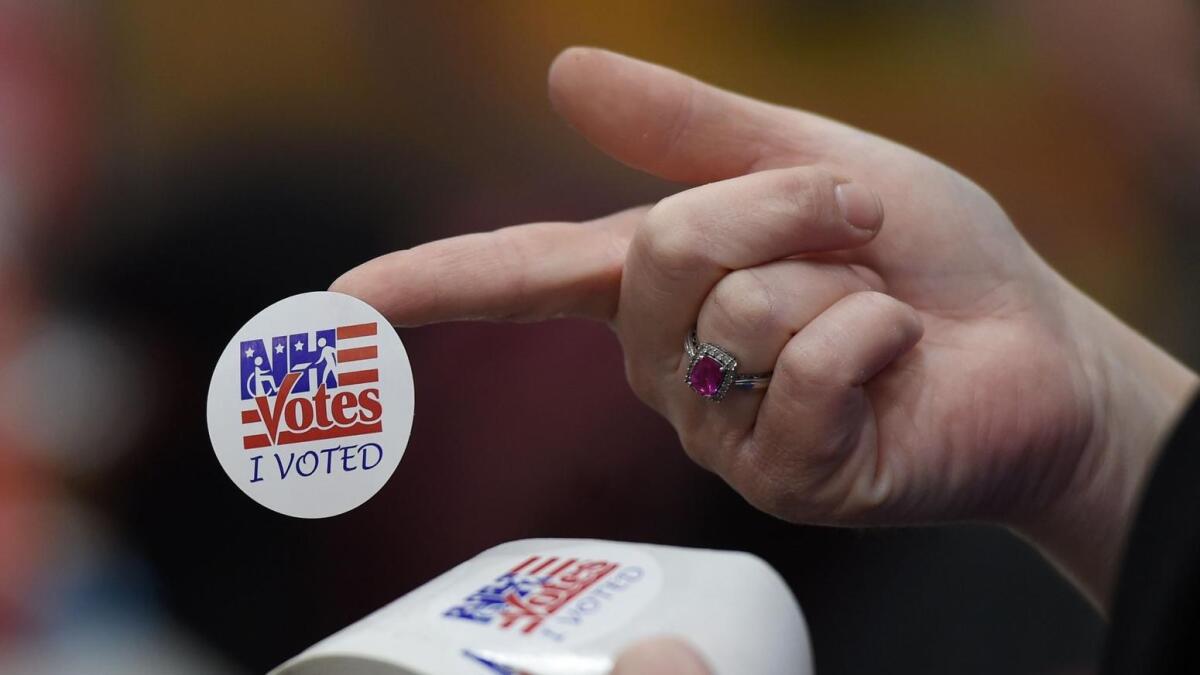
New Hampshire voters are famous for waiting until the last minute to decide which candidate they prefer. And they did not disappoint Tuesday.
Nearly half of Republican voters, 46%, made up their minds in just the past few days, according to exit polls conducted for a consortium of media outlets.
Among Democrats, there was a bit more certainty: Almost one-quarter, or 22%, decided their vote in the final days.
What remains to be seen is whether those last days on the campaign trail changed hearts and minds.
In the week leading up to Tuesday’s voting, not only did the candidates flood the Granite State, but both parties held defining debates that may have swayed voter choices. Or not.
- Share via
Millennial Democrats learn about election from social media more than millennial Republicans
When it comes to election coverage, millennial Democrats are more likely to turn to social media than their Republican counterparts.
Pew Research Center found that 74% of millennial Democrats engaged in the primaries used some form of social media for election updates. Only 50% of Republican millennials did the same.
The finding was not seen among other generations.
Perhaps most striking was the difference in platform use between the parties. About 16% of millennial Democrats use Reddit, compared with 1% of Republican millennials. And 12% of millennial Democrats use Snapchat, versus 5% of Republicans.
Not surprisingly, Facebook reigned supreme for both Republicans and Democrats.
- Share via
Meantime, looking farther down the campaign trail...
- Share via
Donald Trump’s vulgar remark casts shadow over his New Hampshire campaign
Just as Donald Trump was supposed to be savoring an all-but-sure victory in the New Hampshire primary, a vulgar remark that he made has cast a shadow over his campaign for the Republican presidential nomination.
At both of his stops Tuesday at Manchester polling places, reporters asked the brash Manhattan developer to explain why he’d called rival Ted Cruz a “pussy” at a Monday night rally.
Trump was telling the thousands of spectators in the sports arena what a woman in the crowd had just shouted at him.
As soon as Trump stepped out of his black SUV Tuesday afternoon at Webster Elementary school in Manchester, a TV newswoman told him that many women find the term offensive.
She asked if he had any regrets about using it.
“No, not at all,” he responded. “We had a lot of fun.”
Another reporter confronted Trump outside another school polling place and asked him about uttering what he called “the p word.”
“The place was going wild,” Trump replied before greeting a few dozen chanting supporters, many of them from neighboring Massachusetts.
“You’re so politically correct,” Trump said. “And I didn’t say it. This was a repeat of a woman who was screaming it from the audience, right in front. She was screaming it. All I did was repeat, because people said, `What did she say? What did she say?’ I repeated the word.”
In TV interviews earlier, Trump was asked repeatedly whether it was presidential to say such a word in public.
Questions about Trump’s temperament have dogged his candidacy for months. He often swears in public, but he’d been relatively subdued in the days before the New Hampshire vote.
After losing the Iowa caucuses last week, Trump said he would try to be more understated and statesmanlike.
On Tuesday, NBC News anchor Lester Holt asked Trump whether he would say the word in public as president.
“No,” Trump said.
“So are you going to be a different guy as president?” Holt asked.
“Yeah,” Trump responded, adding that he had been a good student, “went to the best school” and came from “a good gene pool” – including an uncle who taught at the Massachusetts Institute of Technology.
“Is this an act?” Holt asked.
“No, it’s not an act,” Trump said. “Last night I had thousands of people. We had a great time, and it wasn’t my word. It was a word that a woman kept shouting.”
“When you’re president, or if you’re about to be president,” Trump said, “you would act differently.”
- Share via
How much did the debate hurt Marco Rubio?
Marco Rubio was riding high after Iowa, where his strong third-place finish in the caucuses left him poised to consolidate mainstream Republican support for his presidential campaign.
But Rubio’s unsteady performance in Saturday’s debate, where New Jersey Gov. Chris Christie threw him off balance by highlighting his repeated reliance on talking points, which opponents quickly labeled robotic, fed doubts about whether the first-term senator from Florida is ready for the White House.
Now New Hampshire voters have a chance to demonstrate whether the debate was a minor stumble or a major roadblock in Rubio’s pursuit of the Republican nomination.
Catch up on our story about the debate to see how the senator’s rivals targeted him on Saturday night.
- Share via
For those keeping track
- Share via
The myth of the well-informed New Hampshire voter: ‘There is a vote Tuesday?’
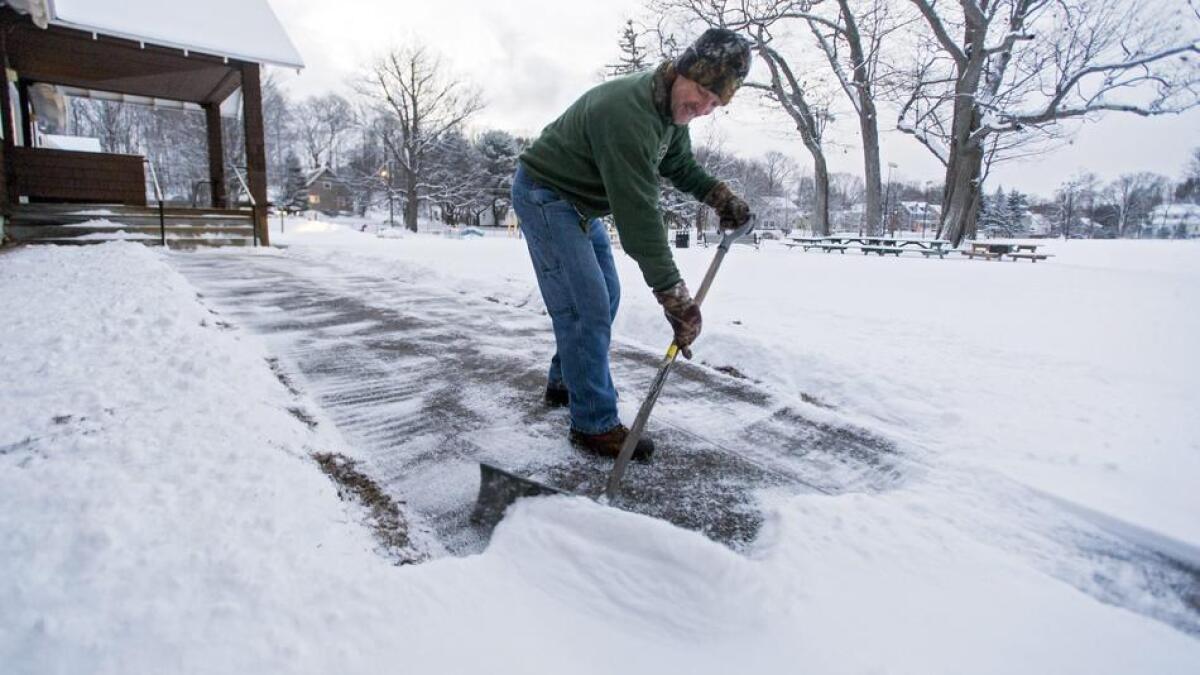
Every four years, politicians descend on New Hampshire to genuflect to the state’s legendary voters. They tell them how wise, how discerning, how independent, how engaged they are.
While voters in other states are accustomed to receiving a certain level of puffery, the New Hampshire voter is put on a pedestal that would make a Nobel laureate jealous.
Leave it to a pair of locals to blow the whole gig open.
“While there is a kernel of truth to many aspects of this caricature, it is primarily a myth,” write David Moore and Andrew E. Smith, a pair of University of New Hampshire professors who may not be invited to many more faculty teas.
Here’s what they found:
- Share via
Guide to New Hampshire’s demographics
- Share via
Marco Rubio is pro-snow. The cold, not so much.
Usually, politicians can’t stand the heat. For Marco Rubio, it’s the cold.
The Sunshine State senator marveled over and over again at New Hampshire’s snowfall Tuesday, and Granite Staters’ ability to withstand the chilly temperature.
“That’s all you’re wearing?” Rubio asked a girl with a thin sweatshirt and no jacket Tuesday morning outside Gilbert Middle School in Derry. “No, you’re cold. You know you are.”
When a woman was having trouble taking a photo, he blamed it on the weather: “It’s so cold, the phone froze.”
Later, he tried out snow policy: “We’re trying to get rid of the snow,” he explained, surprised to learn the flurries were falling from the sky, and not being kicked up by the cars, as he suggested.
Rubio spent a lifetime mostly in Miami, with a childhood detour in Las Vegas, and has little experience with the snowy North. He wore just a blue “Rubio New Hampshire” jacket over his shirt and tie,
“You guys aren’t cold? What’s wrong with you?” he asked voters later outside Windham High School.
When he spotted volunteers from home, he called out: “You guys look nice and warm over here, ready to go back to Florida.“
Even after a long talk with New Hampshire voter Stephanie Tsepas in Derry about cancer research, it all came back to the snow,
“I can tell you guys are from here,” he said as Tsepas and her daughter, who had no jacket, posed for a photo.
The daughter was wearing flip-flops earlier, he was told.
“No, you did not!” Rubio said.
- Share via
Trump, Clinton lead the Facebook conversation in New Hampshire
Ahead of the New Hampshire primary, Facebook released data on which candidates were most talked about in the state.
Donald Trump led the conversation on both sides of the aisle. But the amount of discussion around a candidate doesn’t necessarily mean that he or she will earn the most votes at the polls. Trump also dominated the Facebook conversation in Iowa ahead of the caucuses. But as we know now, it was Ted Cruz who was declared the Republican winner.
- Share via
New Hampshire primary polls: The final read
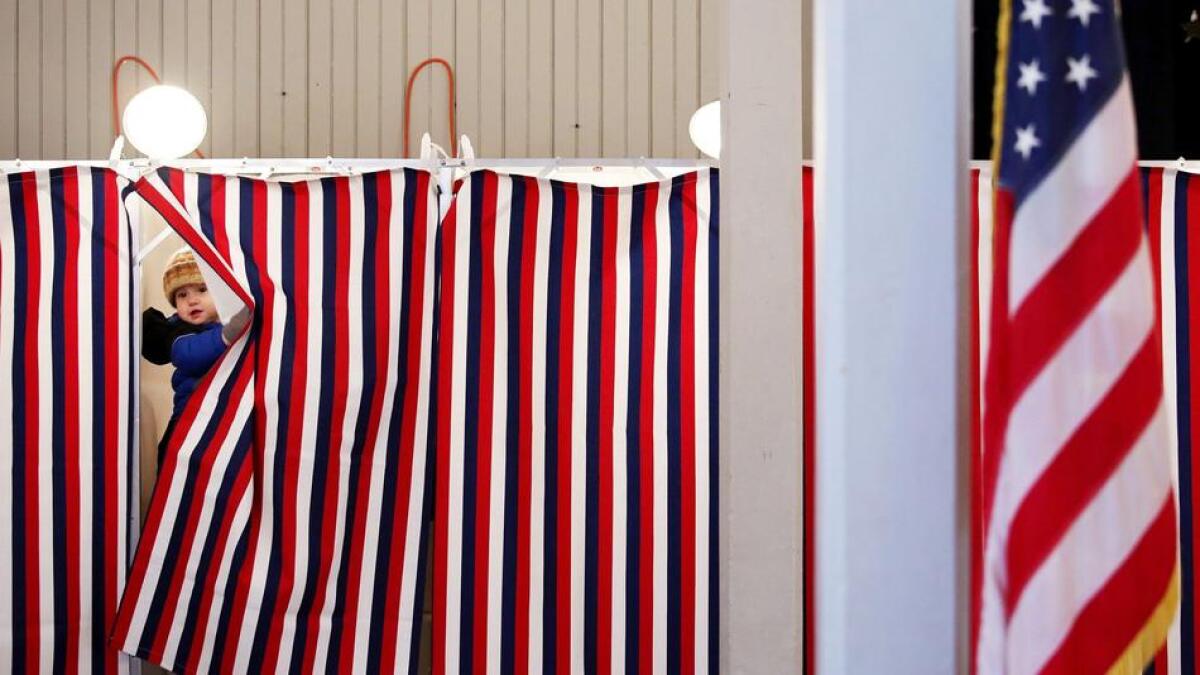
The final round of New Hampshire polls all project that Donald Trump and Sen. Bernie Sanders will win their respective primaries on Tuesday.
After that, it’s anybody’s guess.
New Hampshire is notorious for confounding pollsters. Here’s what they are predicting.
- Share via
Scenes from a New Hampshire polling place
- Share via
A taste of Arkansas in New Hampshire
They’re back.
Scores of Arkansans have descended on New Hampshire again this week to do anything and everything in their power to try to elect Hillary Clinton, as they did for her in 2008 and for her husband two decades ago.
They call themselves the “Arkansas Travelers,” and they do this as a labor of love, paying for travel and lodging out of their own pockets. This week, there are 87 in all, ranging in age from 19 to 81.
Their ringleader is Sheila Bronfman, who has known the Clintons since the 1970s. Bill officiated at her wedding. Hillary hosted her bridal luncheon at the governor’s mansion.
“Everybody in here has some story,” she said. “They’re here because it’s a friend running, and somebody that we all love and care about. We want to do everything we can.”
On Tuesday, they planned to work the polls in Dover, a polling place that just so happens to be the location of Bill Clinton’s famous “last dog dies” speech that is now considered one of the classic New Hampshire primary moments.
Bill Clinton has singled them out at events, saying their dedication to his wife is evidence that her public persona often doesn’t match reality. He joined the group Sunday night at their hotel in Exeter for a Super Bowl watch party.
“That’s what we’re best at: just being able to talk to those undecided voters about the person,” Bronfman said.
She said during one day of door-knocking this week, a voter asked her about Hillary Clinton’s position on banking.
“I told her I thought I had money in the bank if I still had checks. So I wasn’t the person to answer that, but I would get her the answer.”
Bronfman says their numbers have expanded to include friends they’ve made in New Hampshire over the years, as well as family who live outside Arkansas. She has cousins in this week from Mountain View, Calif. Just don’t call them honorary Arkansas Travelers.
“If you’re going to come with us, you’re going to work your butt off,” she said.
- Share via
Detailed results from New Hampshire
The second stop on the 2016 campaign trail is New Hampshire, where voters cast ballots in more than 200 towns across the state. Some rural areas have already reported returns, but most results are not expected until after polls close at 4 p.m. Pacific.
Check here for the latest results.
- Share via
Breaking down the numbers in the New Hampshire primary
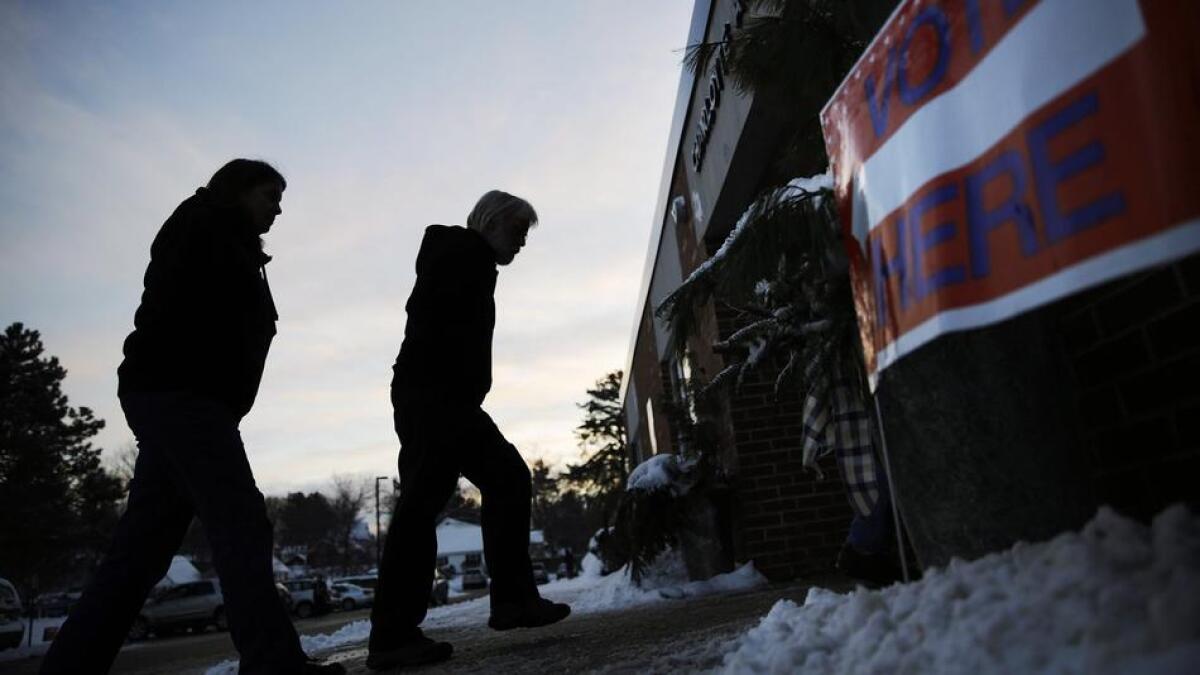
As of Feb. 5, there are 882,959 registered voters in New Hampshire. That total could climb today because the state is allowing voters to register in-person at the polls on election day.
Here’s a look at the math and how it could affect today’s results with projections from the man who knows New Hampshire’s primary better than anyone, the state’s secretary of state, Bill Gardner.
- Registered Democrats: 231,376
- Registered Republicans: 262,111
- Registered “undeclared”: 389,472*
- Projected Republican primary turnout: 282,000
- Projected Democratic turnout: 268,000
- Overall turnout: 550,000
That combined turnout would be a record, surpassing the 529,711 who showed up in 2008.
Already, absentee voting appears to be up — 2% higher than in 2008, Gardner said Monday night. But as usual, more than 90% of voters will cast their ballots today, he said.
Undeclared voters can choose today whether to pull a Republican or Democratic ballot, a wild card that can influence the outcome, or at least the order of finish.
Gardner said he expected that this year, more undeclared voters would vote in the Republican primary.
In 2008, it was the opposite:
- Total ballots cast by undeclared voters: 197,037
- Undeclared voters choosing Democratic ballot: 121,515
- Undeclared voters choosing Republican ballot: 75,522
Gardner said he expects that late-deciding undeclareds will break disproportionately in one direction.
“When one pigeon flies, they all fly,” he said.
- Share via
Highest-ranking Latino in Congress hits Ted Cruz and Marco Rubio on their heritage
Sens. Ted Cruz and Marco Rubio “are running from their heritage” as Latinos on the presidential campaign trail, House Democratic Caucus Chairman Xavier Becerra (D-Los Angeles) charged this week.
Becerra, the highest ranking Latino in Congress, appeared on South Carolina Democratic Party Chairman Jaime Harrison’s online video series “Chair Chats.”
South Carolina Republicans vote on Feb. 20. Democrats vote on Feb. 27.
“Here’s the real problem I have with Ted Cruz and Marco Rubio: it feels like they’re running from their heritage, in my book. They don’t want to say who they are,” Becerra said. “I’m Latino before I’m Democrat. I can’t erase this skin. I’m always going to be brown. I don’t have to always be Democrat. If my party abandons me and my values, I can change.”
Becerra, a Hillary Clinton surrogate who has campaigned for the former secretary of State for months, suggested the senators, both of whom are children of Cuban immigrants, aren’t defending fellow Latinos from the rhetoric of other major presidential candidates.
“Why would Marco Rubio and Ted Cruz flip-flop on issues, hide, run away from issues that they are, or that I would hope they are? The purest example of that is the way they’re attacking these children coming in at the border who are seeking refuge from violence in Central America,” he said.
He said Rubio and Cruz don’t have a problem with Cuban refugees who make it to U.S. soil getting protected status.
“They don’t say anything about changing the law that gives a Cuban this extreme advantage over anyone else. Yet they blast and they attack these immigrant families that are trying to do better for their kids,” Becerra said.
- Share via
In tough New Hampshire fight, voters see two sides of Hillary Clinton
The Democratic presidential primary race here has not provided the sort of drama the Republican contest has wrought, but it has shined a bright light on the woman who remains the party’s front-runner, Hillary Clinton — and demonstrated both troublesome and enticing halves of her candidacy.
Despite months of campaigning, Clinton can still be tone deaf when it comes to explaining herself on key voter concerns, like the private email system she used as secretary of State and the hundreds of thousands of dollars in speaking fees that she received from Goldman Sachs. That would be surprising in a candidate new to the stage, much less someone who has been in the public eye for decades.
Yet she can also surprise, brushing aside a lifelong penchant for privacy at a televised town hall a few days ago to talk movingly about how she balances ego and humility. In politics at this level, where nearly everything is calculated to the word, a human response is rare indeed.
The question coming out of New Hampshire is not, barring a shocking surprise, who will win: Vermont Sen. Bernie Sanders has held an expansive lead throughout. The question for Clinton -- which is more crucial to a general election than a primary, to be sure — is whether those moments at which she has been her best suggest she’s capable of expanding her persona in the months to come.
- Share via
Trump on the latest controversy
It wasn’t overly bad. ... It was like a retweet. … I would never say a word like that. … Every once in a while, you can have a little fun, don’t you think?
— Donald Trump speaking with Fox News on Tuesday about his repeating of a spectator’s shouted vulgarity at a Manchester rally Monday night
- Share via
Californians savor an up-close look at the candidates
Every four years the political circus in New Hampshire draws political tourists, who visit the state to get a glimpse of the presidential candidates they would otherwise only see on television. The Times wrote about the quadrennial phenomenon during the last election, and this one is no different.
Often people drive into the state from neighboring Vermont or Massachusetts, or sometimes from as far away as Virginia. But this year one couple flew all the way from San Clemente.
“We don’t get this in California,” said John Alkema, 71.
- Share via
Clinton’s primary day morning includes selfies and a Fiorina run-in
It had already been a busy primary-day morning for Hillary Clinton, stopping at several polling places and a Dunkin’ Donuts to pick up some goodies for her staff.
At Fairgrounds Middle School in Nashua, she thanked volunteers who were stationed to greet voters, shook some hands and endured the newest burden of campaigning in the smartphone era: the selfie.
“I’ve got so many different styles of selfies,” she told one group of young women. “I feel like I could write a guide.”
Then, during another stop in Derry, Clinton ran into Frank Fiorina, the husband of Republican hopeful Carly Fiorina. They, too, took a picture together.
“Give my best to Carly,” the former secretary of State told him.
- Share via
Looking for clues about Tuesday’s New Hampshire primary? Keep an eye on these towns.
According to New Hampshire Secretary of State Bill Gardner, seven towns have correctly picked the winner of every Republican primary since 1952, the first year when a candidate’s name, rather than his or her delegate slate, appeared on the ballot.
- East Kingston
- Lancaster
- Newmarket
- Pembroke
- Rochester
- Sanbornton
- Washington
These six towns have done the same in every Democratic primary since 1952.
- Epping
- Hudson
- Kingston
- Laconia
- Merrimack
- Rollinsford
In the past week, Chris Megerian and Mark Z. Barabak talked to voters in the Republican towns and found little support for the cast of governors on the ballot.
We’ll update as results from these towns come in tonight.
- Share via
To attack or remain neutral: GOP candidates speak on N.H. primary day
GOP candidates made their rounds on the morning shows heading into Tuesday’s New Hampshire primary — some remained neutral while others aimed punches at front-runner Donald Trump.
New Jersey Gov. Chris Christie said Saturday’s debate in Manchester, N.H., changed the nature of the Republican race.
“If he doesn’t win, it’ll be the biggest story of the evening,” Christie said of Trump in an interview with NBC.
Former Florida Gov. Jeb Bush later said on NBC that he sometimes lashes out at Trump to show his rival he can’t win the presidency on attacks alone. On Monday, Bush posted a tweet calling the businessman a “loser, liar and whiner.”
“I was just giving him a taste of what he gives,” Bush said on NBC’s “Today.” “That’s what bullies need from time to time.”
Not all of the GOP candidates criticized rivals, though. Florida Sen. Marco Rubio and Ohio Gov. John Kasich focused on uniting Republicans.
“By attacking each other, GOP candidates are making the campaign easier for Democrats,” Rubio said on “Fox and Friends.” He also defended his own repetitive remarks during the debate.
Kasich said on MSNBC’s “Morning Joe” that “if you can show both the head and the heart, that’s the way you connect ... that’s the best you can do.”
- Share via
Subplot in New Hampshire -- the Senate
- Share via
New Hampshire secretary of state predicts record turnout
When Donald Trump came to New Hampshire two years ago and declared a presidential run was “absolutely in the cards,” hardly anyone took him, or the idea, seriously. When Sen. Bernie Sanders announced he would seek the Democratic nomination last April, his candidacy was seen as more a crusade for his issues than a credible challenge to Hillary Clinton.
But now as voters head to the polls here, they appear set to hand both men unlikely victories in the nation’s first presidential primary, an outcome reflecting the appeal of political outsiders over well-financed establishment favorites.
New Hampshire’s secretary of state is predicting a record turnout in this rare year in which both major parties feature competitive nomination contests. Bill Gardner, the state’s top election official for four decades, projected 550,000 votes to be cast across the more than 200 cities and towns in the year New Hampshire celebrates the 100th anniversary of its presidential primary.
That would surpass the nearly 530,000 cast in 2008.
- Share via
John Kasich, Bernie Sanders win Dixville Notch
Ohio Gov. John Kasich and Sen. Bernie Sanders of Vermont prevailed in an early test of the New Hampshire primary, with a quaint town’s nine voters casting the state’s first-in-the-nation ballots at midnight.
On the Republican side, Kasich outpaced Donald Trump 3 to 2 in Dixville Notch. The four Democratic voters unanimously chose Sanders over Hillary Clinton.
Nearby Millsfield and Hart’s Location, in the central part of the state, also hold midnight balloting.
Dixville Notch has the most storied tradition.Since 1960, voters have cast ballots inside a tiny room at the Balsams Resort. The town is located along Route 26 in the northern part of the state and is 10 miles from both the Vermont and Canadian borders.
Towns with fewer than 100 people are permitted to vote at midnight, according to New Hampshire election laws.
While many presidential candidates hold rallies and town halls in major cities such as Manchester and Nashua, only Kasich made a campaign appearance in Dixville Notch this cycle.
Are the results a harbinger? Trump, the national front-runner for the GOP nomination, holds a double-digit New Hampshire lead based on an average of polls. Sanders, who represents Vermont and has deep New England roots, is outpacing Hillary Clinton by double digits in the state.
- Share via
How Trump turns off some voters -- and wins others
Kristy Stowell was blunt with the two Donald Trump volunteers who trudged across a deep blanket of snow to greet her in her front yard: He seems like a “ticking time bomb,” she told them.
“He can say some pretty nasty things,” Stowell, a 37-year-old Republican, said as her dog hopped around the fresh powder and barked at the visitors.
After losing the Iowa caucuses last week, Trump said he would try to be more understated and statesmanlike in his run for the Republican presidential nomination.
To some voters, like Stowell, Trump’s usual style is a turnoff. To call people “ugly and fat” is immature, she told the young Trump volunteers as they tried to persuade her to ditch her No. 1 choice, Rubio.
“I would like to see him be just a little more cautious,” she said, even while allowing that she had “a little inner Donald Trump” herself.
- Share via
In New Hampshire, candidates tread through old towns and new political turf
The New Hampshire presidential primary, into which millions of dollars and campaign hours have been dumped, will play Tuesday on different political turf than was trod by candidates in the past.
Broad changes to the state’s population — and that new population’s political views — have made New Hampshire more willing to embrace the insurgent Democratic candidacy of Sen. Bernie Sanders and, potentially, that of Sen. Marco Rubio, if his debate performance over the weekend hasn’t damaged him in the minds of Republican voters.
The stereotypical New Hampshire Republican voter, a rugged, self-sufficient type fixated on limiting taxes, has given way to one living in the southern, Massachusetts-adjacent suburbs, particularly Hillsborough and Rockingham counties. The Democratic Party, once buttressed by mill workers in eastern and central towns, has expanded its reach all over the state, but particularly in those same southern counties and along the western edge of the state, near Vermont.
Click below to learn more about the demographic shifts.
- Share via
It’s primary day! Here’s a podcast
Get up to speed on today’s New Hampshire primary with Cathleen Decker and Christina Bellantoni: Who must do well to survive for the long road ahead?
Here’s what to expect in 11 short minutes.